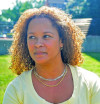
Soldier's Magazine asked me to write a guest blog for their Black History month recognition. I love sharing my family's history. I made one minor change, since I felt bad about leaving my brother's service out of the story. Here is what I sent them.
The story goes, that one day John made the three-mile walk into town to pick up the mail. He was a tall, gangly kid who probably looked older than his 17 years. Barefoot and wearing his raggedy work clothes, he traveled alone down the dirt country road into town. It was the summer of 1917.
John picked up the mail and was headed home when he was confronted by the white sheriff, who was surprised to see a healthy young man walking the streets. There was a war on after all. Most of the white boys in town had already joined up and shipped off to serve overseas.
So then and there, the sheriff arrested John, charged him with draft dodging, stuck him on a truck headed north and shortly thereafter, John was shipped off to France, where he wrangled mules throughout the rest of the war.
John made it back home after the war and raised a family in the same Mississippi town.
By the time World War II started, my father was 19. He didn’t hesitate to answer the nation’s call, understanding the adventure and the freedom release from his

My mother, Ruth Doyle (Kokesh) found her own kind of freedom during WWII as a member of the Women's Army Corps
oppressive Mississippi town would mean. He was assigned to one of Patton’s all-black tank battalions, landed on Utah beach the day after D-day, was cheered as a liberator by Belgians, fought in the Ardenne Forest during the Battle of the Bulge and eventually came home a man who could no longer tolerate the harsh segregation of the south. He moved north.
My parents met after the war, in Minnesota, where my mother, after having served during the war in the Women’s Army Corps, had found her own kind of freedom. She and my father largely ignored the social stigma that accompanied their interracial union.
I grew up hearing stories about my father’s war, my grandfather’s war, my mother’s service and even about my mother’s father who had been a cavalry Soldier on the plains of the Dakotas. Military service was part of our history. The Army had played a major role in changing my father’s opportunities. And had largely been the reason my parents met.
So my father wasn’t a bit surprised when I told him I wanted to join the Army. My brother, who had already joined ROTC and was well on his way to being an Infantry officer, had dared me to do it, saying I could never make it through basic training. Of course, I had to prove him wrong, but aside from his juvenile taunt, everyone in the family was supportive.
Joining the Army Reserve was the best decision I ever made.

This picture was taking during my deployment to the Bosnian peacekeeping mission in 1997. The deployment is the basis for my first novel, THE PEACEKEEPER'S PHOTOGRAPH.
 M. L. Doyle has served in the U.S. Army at home and abroad for more than two decades as both a soldier and civilian. Mary is the author of The Desert Goddess series, an urban fantasy romp consisting of The Bonding Spell and The Bonding Blade. She has also penned The Master Sergeant Harper mystery series which has earned numerous awards including an IPPY, a Lyra Award and the Carrie McCray Literary Award. Mary is the co-author of two memoirs; A Promise Fulfilled; the story of a Wife and Mother, Soldier and General Officer (Jan. 201) and the memoir, I’m Still Standing: From Captive U.S. Soldier to Free Citizen—My Journey Home (Touchstone, 2010), which was nominated for an NAACP Image award. Mary's work has been published by The Goodman Project, The War Horse, The WWrite Blog and The Wrath-Bearing Tree, an online magazine for which she serves as a fiction editor. A Minneapolis, Minnesota native, Mary current lives in Baltimore. You can reach her at her website at mldoyleauthor.com.
M. L. Doyle has served in the U.S. Army at home and abroad for more than two decades as both a soldier and civilian. Mary is the author of The Desert Goddess series, an urban fantasy romp consisting of The Bonding Spell and The Bonding Blade. She has also penned The Master Sergeant Harper mystery series which has earned numerous awards including an IPPY, a Lyra Award and the Carrie McCray Literary Award. Mary is the co-author of two memoirs; A Promise Fulfilled; the story of a Wife and Mother, Soldier and General Officer (Jan. 201) and the memoir, I’m Still Standing: From Captive U.S. Soldier to Free Citizen—My Journey Home (Touchstone, 2010), which was nominated for an NAACP Image award. Mary's work has been published by The Goodman Project, The War Horse, The WWrite Blog and The Wrath-Bearing Tree, an online magazine for which she serves as a fiction editor. A Minneapolis, Minnesota native, Mary current lives in Baltimore. You can reach her at her website at mldoyleauthor.com.